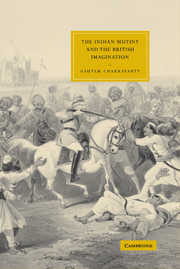Book contents
- Frontmatter
- Contents
- Acknowledgements
- Glossary
- Introduction
- 1 From chronicle to history
- 2 Reform and revision
- 3 Romances of empire, Romantic orientalism and Anglo-India: contexts, historical and literary
- 4 The ‘Mutiny’ novel and the historical archive
- 5 Counter-insurgency and heroism
- 6 Imagining resistance
- Epilogue
- Notes
- Bibliography
- Index list
- CAMBRIDGE STUDIES IN NINETEENTH-CENTURY LITERATURE AND CULTURE
3 - Romances of empire, Romantic orientalism and Anglo-India: contexts, historical and literary
Published online by Cambridge University Press: 22 September 2009
- Frontmatter
- Contents
- Acknowledgements
- Glossary
- Introduction
- 1 From chronicle to history
- 2 Reform and revision
- 3 Romances of empire, Romantic orientalism and Anglo-India: contexts, historical and literary
- 4 The ‘Mutiny’ novel and the historical archive
- 5 Counter-insurgency and heroism
- 6 Imagining resistance
- Epilogue
- Notes
- Bibliography
- Index list
- CAMBRIDGE STUDIES IN NINETEENTH-CENTURY LITERATURE AND CULTURE
Summary
Of all the unparalleled features which the English Empire in India presents, not one is so unique as the slightness of the machinery by which it is united to England, and the slightness of its reaction upon England. She (England) tries to raise India out of the medieval into the modern phase, and in the task she meets with difficulties and incurs dangers, but she incurs no risk whatever from being drawn down by India towards the lower level, or even being checked for a moment in her natural development.
J. R. Seeley, The Expansion of England (1883)ROMANCES OF EMPIRE
Among the early theorists of the literary yield of British expansion was Alfred Comyn Lyall, the Anglo-Indian poet, historian and administrator, posted in the district town of Bulandshahar where the rebel leader, Nawab Walidad Khan, ousted the British in the summer of 1857. In ‘Novels of Adventure and Manners’, an essay he wrote for the Quarterly Review in 1894, Lyall traced a literary-historical lineage: from Romantic orientalism, through the oriental novels of Walter Scott, The Surgeon's Daughter and The Talisman, to contemporaries such as R. L. Stevenson and Rudyard Kipling; noting the waning of romance as ‘a new class of writers … adopted the Novel of adventure to the requirements of latter-day taste, to the widening of knowledge, and the diversified expansion of our national life’.
- Type
- Chapter
- Information
- The Indian Mutiny and the British Imagination , pp. 72 - 104Publisher: Cambridge University PressPrint publication year: 2005

